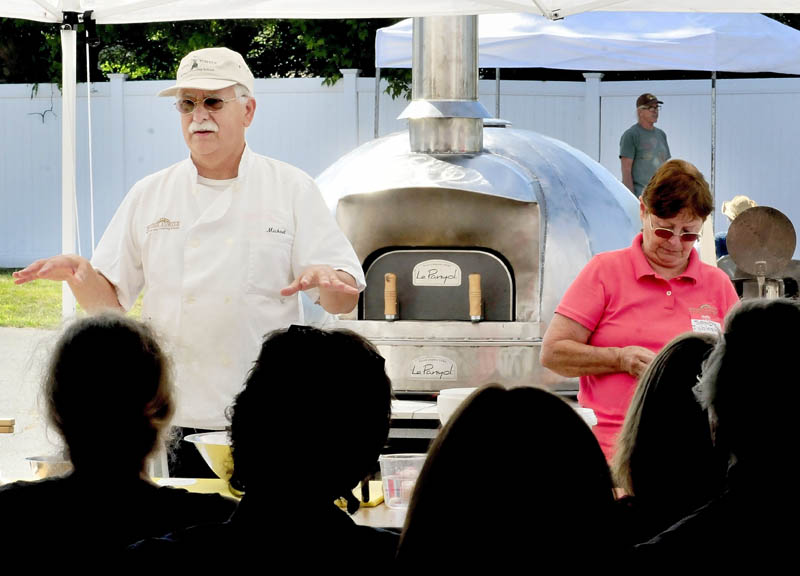SKOWHEGAN — The ancient Roman architect Vitruvius identified three qualities that a structure should posses — functionality, durability and beauty.
That structure could be the Roman aqueducts, a home, or even a loaf of bread, according to Richard Miscovich, an expert in wood-oven fired cooking and this year’s keynote speaker at the annual Kneading Conference in Skowhegan.
While building his own wood-fired oven years ago, Miscovich said he came across Vitruvius’ idea in the book “Bread Alone” by Dan Leader.
“I was just smitten with the idea. I wrote it across the top of my notebook and think about it all the time,” said Miscovich.
On Thursday, he said the ancient Roman principles that have inspired him are also applicable to the four interest groups — grain growing, milling, oven building and baking — at the two-day conference sponsored by the Maine Grain Alliance.
Beauty, the first principle addressed by Miscovich, is important because it can help people feel an emotional connection to a loaf of bread or the oven in which it was made, he said. At the same time it is subjective and hard to define, so it is best thought of as a vehicle for the other two principals, said Miscovich.
For example, he showed a picture of a beautiful loaf of bread from a farmer’s market covered in white flour.
“The flour was perhaps a decorative gesture, a way of making the bread look beautiful. But it is also something that ties into the idea of functionality, the use of flour, which is the simplest ingredient in the bread,” he said.
Functionality means using simple and ancient tools such as fire and high roasting temperatures to cook not just bread and pizza, but animals and vegetables.
“For years I used my oven just for baking pizza and bread, but I realized that I could be making use of heat and fire in other things,” said Miscovich. “When I have a fire going I try to make staples, like roasted onions, to keep around my house.”
Functionality is also the way ingredients and tools like fire are used.
For example, he likes to use local chicken or beef fat in place of olive oil because it is less expensive and can be produced at home, he said.
When making a fire, he also likes to use a technique he calls “the firewall,” which is a way of dividing a wood-fired oven to cook at different temperatures or render different flavors.
One example Miscovich pointed to was the process of making homemade bacon from pork belly, which can be done by building a wall of bricks to keep smoke on one side of the oven while protecting the pork belly from the heat of the flames and allowing it to slowly smoke.
When the fire has died down, Miscovich said he likes to dry herbs over the embers. He puts a fan near the oven to circulate the air and says the herbs can be dried in about three to four hours. One advantage of this method is that they retain their color.
“I think that is an important point about functionality, that it is the idea of using the heat completely. Ultimately I will start another fire, but I try to make use of the natural cycle,” said Miscovich.
The ancient Egyptians began baking bread 6,000 years ago, but people have been using fire to cook for about 1.5 million years, he said.
“There is a community created by being around fire and that is one of the most durable things we have in this industry. Looking forward to recent times there are things that each one of us use that are durable,” he said.
That includes the physical tools and structures used in cooking, milling and baking, but also the techniques of producing loaf after loaf and building fire after fire— things Miscovich called “cultural durability.”
The task of sharing these tools and techniques with young people is something Miscovich views optimistically.
“It’s not something we have to do, but a way of showing them what we’ve done. With that we can set higher expectations for high-quality food,” he said.
The Kneading Conference gathers novice and professional bakers, millers and farmers from around the United States and Canada to learn and exchange information about growing and milling grains, making artisan breads and pastries and building and managing wood-fired ovens.
Held annually at the Skowhegan Fairgrounds, the conference continues Friday with culinary and agricultural experts presenting hands-on demonstrations, lectures and panel discussions on baking, grain farming and milling, brick oven construction, and baking techniques.
There is an Artisan Bread Fair open to the public 9 a.m. to 3 p.m. Saturday at the Skowhegan State Fairgrounds. Parking is $2.
Rachel Ohm — 612-2368
rohm@mainetoday.com
Send questions/comments to the editors.



